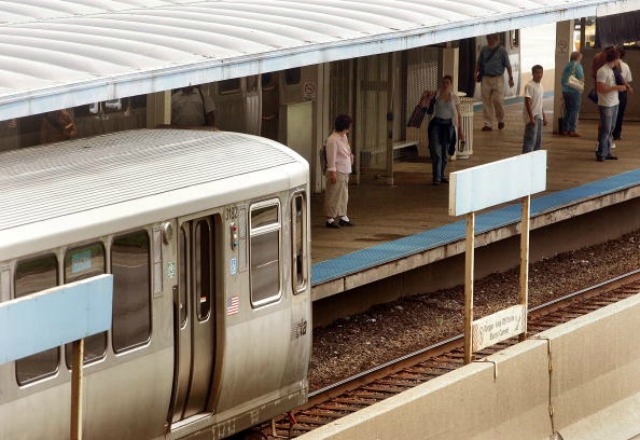A Look At The Effectiveness & Legal History Of Mass-Transit Bag Checks
By Stephen Gossett in News on Feb 15, 2017 7:18PM

Getty Images / Photo: Tim Boyle
When CTA riders encountered random bag checks at the Addison Red Line Stop on Tuesday, rumors soon swirled that Immigration and Customs Enforcement was involved in the screenings— rumors which ICE confirmed were false.
The random bag screenings place a Mobile Explosives Screening Team at train stations, unannounced and at random. As was the case on Tuesday, local law enforcement often partners with Homeland Security personnel—under the VIPR program—on the security checks.
As we noted on Tuesday, the program has been in place since 2014. Even as similar protocol in New York, which dates back to 2005, was upheld to be constitutional after a challenge from the ACLU, some civil-liberties advocates still harbor doubts about the program after all this time.
“We’ve looked at this program and have always been concerned about ensuring people have the option of not submitting to a search,” Ed Yohnka, Director of Communications and Public Policy of the American Civil Liberties Union, told Chicagoist. “We’ve always wanted to hear if anyone has been coerced or forced into a search by one of these teams.”
Yohnka however said the ACLU-IL has not received any complaints of such coercion in two-plus years since the program was initiated.
Riders do have the option of not submitting to a search—in which case he or she is not allowed to board the train. That option to decline was one of the central elements a legal determination—MacWade v. Kelly—that ruled the similar program in New York City did not violate the Fourth Amendment of the Constitution.
Other factors that led to the search being ruled “minimally intrusive” were police being able to search only containers capable of holding explosives, searches being conducted in the open, typical searches usually lasted only “a matter of seconds,” and authorities “employ a formula that ensure they do not arbitrarily exercise their authority.”
“Although a subway rider enjoys a full privacy expectation in the contents of his baggage, the kind of search at issue here minimally intrudes upon that interest,” the ruling stated.
The NYCLU of course saw things differently. Donna Lieberman, Executive Director of the NYCLU said in 2005 when the organization initially filed its challenge:
"It is essential that police be aggressive in maintaining security in public transportation. But our very real concerns about terrorism do not justify the NYPD subjecting millions of innocent people to suspicionless searches in a way that does not identify any person seeking to engage in terrorist activity and is unlikely to have any meaningful deterrent effect on terrorist activity."
In 2009, the NYCLU filed another related suit, on behalf of a Brooklyn man who claimed he was stopped an excessive number of times by NYPD—21 times in three years—because he looks Middle Eastern. He settled with the city for $25,000.
The searches seem to have turned up little evidence of terrorist activity in Chicago and some other cities. Washington DC’s transit search program has been criticized as “security theater.” In it’s first 18 months of operation, the program yielded no arrests. (The city's Metro Transit Police Chief argued that lack of arrests should not be read as ineffectiveness.) And here in Chicago, in the program’s first four months, officials found no explosive material in more than 2,500 bags searched. Police arrested one person in that time after he tried to pass through a turnstile after not submitting to a bag search.
The Chicago police chief communications officer referred to Chicagoist to the Department of Homeland Security for the most recent statistics. The Transportation Security Administration declined to provide figures. "Specific information regarding the frequency with which the VIPR Program utilizes explosives detection capabilities and the results that have been achieved is considered Sensitive Security Information," TSA said in a statement.
This post has been updated.